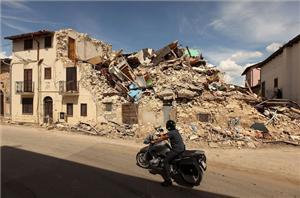DisastersItalian seismologists sent to jail for failing to predict earthquake
A judge sentenced six Italian seismologists and a former government official to six years in prison over the deadly 6 April 2009 earthquake in L’Aquila; the seven defendants were found guilty of manslaughter for not alerting the public to the 6.3 magnitude; the tremor killed 309 people, injured thousands, and destroyed cities and villages in the affected region; scientists, alarmed by the verdict, have warned that the case might have a chilling effect, making scientists and experts think twice before sharing their knowledge with the public for fear of being targeted in lawsuits

Damage following the 2009 L'Aquila, Italy, earthquake // Source: alkurum.net
A judge sentenced six Italian seismologists and a former government official to six years in prison over the deadly 6 April 2009 earthquake in L’Aquila. The seven defendants were found guilty of manslaughter.
The charges against the seven were brought after prosecutors pointed out that the scientists could not explain a fundamental contradiction in their position.
The prosecutors said the defendants gave a falsely reassuring statement before the quake, causing many people to stay in the region rather than go to safer grounds. Now, if the seismologists say they should not be charged with failing to warn the public of an imminent quake because there was no way to predict major quakes, then, the prosecutors argue, the scientists should not have issued reassuring messages because there is also no way to predict that a major quake would not occur.
The 6.3 magnitude quake devastated the city and killed 309 people.
The BBC reports that many smaller tremors had rattled the region in the months and weeks before the quake that destroyed much of the historic city, and inflicted a major damage on several neighboring villages. Moreover, prosecutors said that a result of these series of tremors, there were observable changes in the behavior of animals and birds – changes associated with a forthcoming major quake which animals somehow sense.
Defense lawyers immediately announced that they will appeal against the sentence. In the Italian legal system, convictions are not definitive until they have gone through at least one level of appeal, so the seven defendants are likely to stay out of jail for a while yet.
The seven defendants were all members of the National Commission for the Forecast and Prevention of Major Risks. The responsibility of the commission is to monitor and analyze seismic information in order to issue warning of impending quakes. The Washington Post reports that the six scientists were accused of having provided “inexact, incomplete and contradictory” information about the danger of the tremors felt ahead of 6 April 2009 quake.
La Repubblica reports that the judge also barred from ever holding public office again.
One of its witnesses, Guido Fioravanti, whose father died in the earthquake, described how had called his mother at about 11 p.m. on the night of the earthquake, immediately after the first tremor: “Mi ricordo la paura che usciva dalle sue parole. In altri tempi sarebbero scappati ma quella notte, assieme a mio padre, si sono ripetuti quello che avevano sentito dalla commissione Grandi rischi. E sono rimasti lì” (“I remember the fear in her voice. On other occasions they would have fled but that night, with my father, they repeated to themselves what the risk commission had said. And they stayed”).
The BBC notes that many scientists, from different disciplines, say they are alarmed by the verdict. Some scientists have warned that the case might have a chilling effect, making scientists and experts think twice before sharing their knowledge with the public for fear of being targeted in lawsuits.
Before the verdict, more than 5,000 scientists signed an open letter to Italian president Giorgio Napolitano in support of the group of seismologists in the dock.
David Rothery of the U.K.’s Open University told the BBC that earthquakes were “inherently unpredictable.”
“The best estimate at the time was that the low-level seismicity was not likely to herald a bigger quake, but there are no certainties in this game,” he said.
Malcolm Sperrin, director of medical physics at the U.K.’s Royal Berkshire Hospital, said that the sentence was surprising and could set a worrying precedent. “If the scientific community is to be penalized for making predictions that turn out to be incorrect, or for not accurately predicting an event that subsequently occurs, then scientific endeavor will be restricted to certainties only and the benefits that are associated with findings from medicine to physics will be stalled,” he told the BBC.
